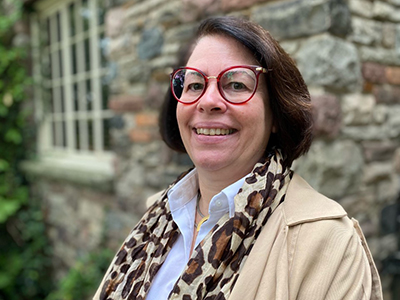Research News: Does moral injury change the brain?
Recognizing the toll that the pandemic has taken on many health care workers’ mental health, Dr. Ruth Lanius is examining the role that moral injury plays, and its effects on the brain.
“The one thing we are trying to do is look at what happens in the brain when a person recalls a moral injury event,” said Lanius, Professor at Western’s Schulich School of Medicine & Dentistry and Associate Scientist at Lawson Health Research Institute. “We want to study what happens in the brain and how to better treat individuals suffering from moral injury.”
Moral injury refers to an injury to an individual’s moral conscious, which can produce profound emotional guilt and shame. Lanius, who is also a psychiatrist at London Health Sciences Centre, says during the pandemic, health care workers have been put in very emotionally difficult situations, having to make often difficult decisions.
 “Those suffering from moral injury have a cognitive or thinking component, which may include repeated thoughts that they didn’t provide the best care or that they let their family down due to their intense work schedule or need to self-isolate,” explains Lanius. “These thoughts are frequently coupled with intense visceral distress, and I think once we help resolve the visceral distress, we will also see the negative thinking patterns settle down.”
“Those suffering from moral injury have a cognitive or thinking component, which may include repeated thoughts that they didn’t provide the best care or that they let their family down due to their intense work schedule or need to self-isolate,” explains Lanius. “These thoughts are frequently coupled with intense visceral distress, and I think once we help resolve the visceral distress, we will also see the negative thinking patterns settle down.”
The study will involve approximately 60 health care workers. Participants will undergo a functional MRI scan at the beginning of the study, followed by eight weeks of optional treatment, and then another MRI scan to see if and how the moral injury changes and possibly resolves within the brain.
“This is often very validating for the health care workers because since brain scans can make the invisible wound of moral injury visible,” said Lanius.
The ultimate goal of the study is to understand what networks of the brain are activated with moral injury which will help to establish more neuroscientifically-guided treatments.
“We have to help our health care workers heal for the tremendous hardship they have endured. This study provides hope that we can move on from this pandemic and get back to a normal life,” she said.
The research team is currently recruiting health care workers for this study. Interested participants can contact research coordinator Suzy Southwell at: is 519-685-8500 ext. 35186 or email: suzy.southwell@lhsc.on.ca









